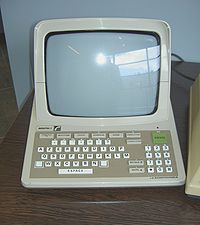| Minitel, France, 1982. Wikipedia |
Paris, of course, was amazing. I was there 13 years ago and I never imagined it would take so long to get back. I love art, music, French literature, history, urban walks, and food, and Paris has all of that in spades. It is the most gorgeous, romantic city on earth and only San Francisco comes close. I have heard SF referred to as "Paris West" but interestingly enough, no one calls Paris "San Francisco East."
I inadvertently got unplugged in Europe. I had all of these great apps on my phone that were going to help me translate, navigate, mediate, and explicate my experiences in Europe, but Verizon charges Louis the XVIth era prices for international data and over-seas connections. The phone stayed home. I have a camera with the latest card format allowing me to take thousands of pictures and movies on my camera but my Ubuntu Linux netbook would not read the card. Neither would any internet cafe in Europe using Windows XP, which is most of them. On top of that, the budget hotels we were staying in were not exactly up to snuff with wireless. Wifi worked in the lobby and the first four floors, but after that, we were out of luck. Which is fine, we tend to stay in the kind of hotels that brag about "potable water." So I spent most of my vacation disconnected - I did not feel smarter; on the contrary, I would have loved to be able to talk to my people while traveling.
One of the headlines in Paris while I was there was "The second life of Minitel." Minitel was the bulletin board of the nation in the pre-internet age. It was their AOL. It has been around for 30 years and they are finally pulling the plug. They were going to stop the service last year but they gave in to pressure to wait for the 30th anniversary. But what exactly was Minitel? Minitel was a terminal-based service that used existing phone lines to let users access bulletin boards, make travel reservations, order from retail outlets, access databases, and telephone directories. The terminals were given away for free to 9 million people and the service is used by 25 million people because there is also a computer interface to the service. This was a lot like the bulletin board services in the United States.
According to Wikipedia, "Minitel was often considered as an impediment for a fast deployment of the Internet in France, since it already provided safe and easy online access for many useful services without requiring a personal computer. Indeed, it still has advantages over the Internet: it does not require subscribing to a service (except the phone service), buying and maintaining a personal computer..."
However the Minitel system got French people used to making purchases online and using online services for connecting to one another and communicating online. So it made the Internet possible in France. The people of France were familiar with all of the issues that we were only to meet up with later: the government did not intervene in pornographic bulletin boards, they said it was the parents responsibility.
In 1986, French students used the Minitel system to coordinate a national strike, demonstrating an early use of digital communication devices for "participatory technopolitical ends." This was a prelude to the Velvet Revolution in Eastern Europe, Twitter, and the Arab Spring.




No comments:
Post a Comment